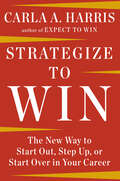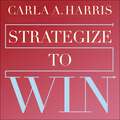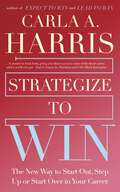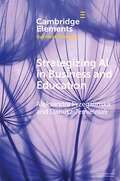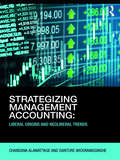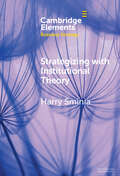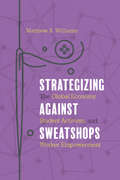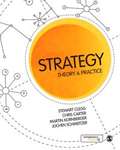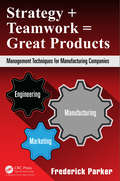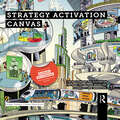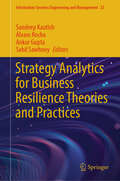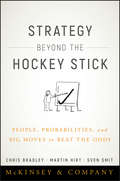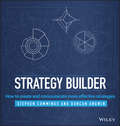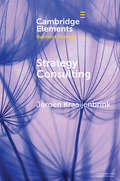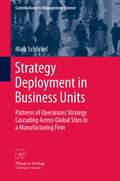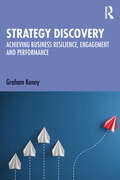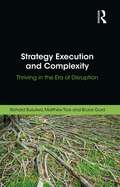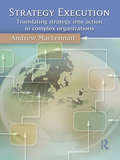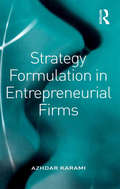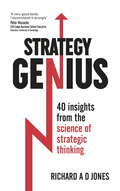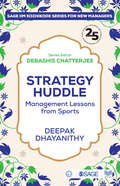- Table View
- List View
Strategize to Win
by Carla A. HarrisThe Wall Street powerhouse and author of Expect to Win offers a new way to conceptualize career strategies and gives us proven tools for successful change Whether we're starting out, striving toward a promotion, or looking for a new opportunity, the working world isn't what it used to be. Wall Street veteran Carla Harris knows this, and in Strategize to Win she gives readers the tools they need to get started; get "unstuck" from bad situations; redirect momentum; and position themselves to manage their careers no matter the environment. With her trademark galvanizing advice, Harris identifies and clarifies issues that are often murky, offering lessons on: Identifying and making the most of your work profile (are you a Good Soldier? a Leader? an Arguer?); preparing for a career change without going back to school or taking a step down: honing three essential skills industry leaders possess (and how to get them); tuning into unspoken cues; and thriving through change. Introducing a new way of planning one's career in five-year units, Strategize to Win distills battle-tested and step-by-step tools that Carla has used to launch and sustain her own successful career and help others move forward, recover from setbacks, and position themselves for success.
Strategize to Win: The New Way to Start Out, Step Up and Start Over in Your Career
by Carla HarrisStrategic careers advice and proven tools for successful job change, from a powerhouse of Wall Street.Whether you're starting out, striving toward a promotion, or looking for a new opportunity, the working world is changing. Discover how to manage your career and position yourself for success no matter the environment. Wall Street powerhouse Carla Harris has distilled the tools you will need to get started; get unstuck from bad situations or redirect your momentum. With her trademark galvanizing advice, Harris identifies and clarifies issues that are often murky, offering lessons on:· Identifying and making the most of your work profile· Preparing for a career change without going back to school or taking a step down· Honing three essential skills industry leaders possess· Tuning into unspoken cues· Thriving through changeWith practical advice on planning your career, interview techniques and negotiating compensation, Strategize to Win presents battle-tested tools that Carla has used to launch and sustain her own successful career. Her audiobook will help you move forward, recover from setbacks and set yourself up for success.(P) 2014 Gildan Media LLC
Strategize to Win: The New Way to Start Out, Step Up or Start Over in Your Career
by Carla HarrisWhether you're starting out, striving toward a promotion, or looking for a new opportunity, the working world is changing. Discover how to manage your career and position yourself for success no matter the environment. Wall Street powerhouse Carla Harris has distilled the tools you will need to get started; get unstuck from bad situations or redirect your momentum. With her trademark galvanizing advice, Harris identifies and clarifies issues that are often murky, offering lessons on:· Identifying and making the most of your work profile· Preparing for a career change without going back to school or taking a step down· Honing three essential skills industry leaders possess· Tuning into unspoken cues· Thriving through changeWith practical advice on planning your career, interview techniques and negotiating compensation, Strategize to Win presents battle-tested tools that Carla has used to launch and sustain her own successful career. Her book will help you move forward, recover from setbacks and set yourself up for success.
Strategizing AI in Business and Education: Emerging Technologies and Business Strategy (Elements in Business Strategy)
by Dariusz Jemielniak Aleksandra PrzegalinskaThis Element proposes a clear and up-to-date description of the state of artificial intelligence today, not only in terms of business processes and strategies, but also its societal reception. It presents our view of the technology landscape, avoiding both the forward-looking, rose-colored utopia and the hyper-apocalyptic gloom. It does so in a concise form, addressing a complex issue in 9 concise and easy-to-read chapters. It aims to discuss the current state of machine learning and AI in strategic management, and to describe the emerging technologies. It conceptualizes their adoption, and then consider the effects of AI technologies' maturity in business organizations.
Strategizing Management Accounting: Liberal Origins and Neoliberal Trends
by Danture Wickramasinghe Chandana AlawattageThe theory and practice of management accounting should be seen within the context of varieties of global capitalism, to appreciate its role as a 'calculative technology of capitalism' which is practiced on factory floors, corporate boards, computer networks, spreadsheets, and so forth. This new textbook is the first to introduce the field from a rounded social science perspective. Strategizing Management Accounting offers a theoretical discussion on management accounting’s strategic orientation by accommodating two interrelated lines of analyses, from historical and contemporary perspectives. The book illustrates how 'new management accounting' has evolved into the form in which it exists today in its neoliberal context and how those new management accounting practices have become manifestos for the managers, as calculative technologies of decision making, performance management, control, corporate governance, as well as global governance, and development within various forms of organizations across the globe. Each chapter draws on Foucauldian analysis of biopolitics explaining how neoliberal market logic informs a set of strategies and mechanisms through which various social entities and discourses are made governable by considering them as biopolitical entities of global governance. Written by two recognized accounting experts, this book is vital reading for all students of management accounting and will also be a useful supplementary resource for those wanting to understand and research accounting's vital role in contemporary society.
Strategizing With Institutional Theory (Elements in Business Strategy)
by Harry SminiaThis text consults seven variants of institutional theory to explore how these can be applied to strategic management. These variants are New Institutional Economics, Old Institutionalism, New Institutionalism, institutional entrepreneurship and change, intra organizational institutionalization, institutional logics, and institutional work. In doing so, three strategic management styles are distinguished: competitiveness based strategic management, legitimacy based strategic management, and performativity based strategic management. While the competitive based style sees institutional theory submitting to mainstream strategy research, offering additional variables and considerations to explain competitive advantage, the legitimacy based style makes institutional theory a strategy theory in its own right by providing an explanation for an organization's viability that emphasizes legitimacy over competitive advantage. The performativity based style is an even more radical departure from mainstream strategizing by purporting that a future is actively created with organizations making contributions as emerging issues are being dealt with.
Strategizing against Sweatshops: The Global Economy, Student Activism, and Worker Empowerment
by Matthew S. WilliamsFor the past few decades, the U.S. anti-sweatshop movement was bolstered by actions from American college students. United Students Against Sweatshops (USAS) effectively advanced the cause of workers’ rights in sweatshops around the world. Strategizing against Sweatshops chronicles the evolution of student activism and presents an innovative model of how college campuses are a critical site for the advancement of global social justice. Matthew Williams shows how USAS targeted apparel companies outsourcing production to sweatshop factories with weak or non-existent unions. USAS did so by developing a campaign that would support workers organizing by leveraging their college’s partnerships with global apparel firms like Nike and Adidas to abide by pro-labor codes of conduct. Strategizing against Sweatshops exemplifies how organizations and actors cooperate across a movement to formulate a coherent strategy responsive to the conditions in their social environment. Williams also provides a model of political opportunity structure to show how social context shapes the chances of a movement’s success—and how movements can change that political opportunity structure in turn. Ultimately, he shows why progressive student activism remains important.
Strategizing in the Polish Furniture Industry (Elements in Business Strategy)
by Paulina Bednarz-ŁuczewskaThe Element provides a broad overview of the Polish furniture industry. It tells the story of a sector that grew from a bundle of craftsmen into Europe's largest and the world's second-largest furniture exporter within three decades. This is also the story of a sector marked by a subordinate role in global value chains and a mediocre ranking in the global value capture game. Equipped with the methods of anthropology and the theoretical lenses of strategic management, the author guides the reader through the living world of the sector's strategists – their environment, resources, and dilemmas. The Element reconstructs how the strategists engage in creative dialogue with factors at the macro level (semi-peripheral economy, global value chain position), meso level (human capital, governmental programs) and micro level (family traditions, personal interests) to create their unique business models.
Strategy
by Stewart CleggInstructors of management present a textbook on business strategy not just as a set of techniques, but as social, organizational, and political orientation. The overall themes are central currents in strategy, the politics of strategy, and global strategies. Among the topics are strategy and competitive performance, marketing and branding as strategic forces, strategic decision making, organizational politics and strategy, international and collaborative strategies, and globalization and strategy. Color is used lavishly throughout. Annotation ©2011 Book News, Inc. , Portland, OR (booknews. com)
Strategy + Teamwork = Great Products: Management Techniques for Manufacturing Companies
by Frederick ParkerMost books on manufacturing focus on production. This book is different; it describes techniques for excelling in engineering design, marketing strategies, and customer service inside a manufacturing company. Managing a successful manufacturing company in today‘s competitive global economy requires teamwork between the above disciplines. It is no l
Strategy Activation Canvas
by Robert Wreschniok Ansgar ThiessenThe Strategy Activation Canvas is the new standard for accelerating strategies – beginning where classical strategies end: with its activation. While many management and business canvases focus on developing a strategy, the Strategy Activation Canvas helps leaders and decision-makers to bring strategies to life. This book demonstrates for the first time how entire organizations can be “activated”: how people can not only perceive and implement a new strategy, but how entire organizations can be heavily involved in its making, how strategies are made visible and experienced, and how people can play an active and sustaining role throughout bringing a strategy to life. With their decades of experience in large scale organizations, Thiessen and Wreschniok pair their knowledge with case studies from Allianz, Baloise, E.ON, Hamburg Commercial Bank, Microsoft, NORD/LB, Swisscom or Swiss Re, shared by leaders who have remarkably accelerated the success and value of their strategies on the back of strategy activation. This book is an essential resource for managers who have responsibility for strategic initiatives and transformation programs of any kind.
Strategy Analytics for Business Resilience Theories and Practices (Information Systems Engineering and Management #33)
by Ankur Gupta Álvaro Rocha Sandeep Kautish Sahil SawhneyA strategy is a blueprint of actions taken by managers to achieve the organization’s mission and vision and other long-term goals. In long term, strategy determines the success of an organization. While evaluating strategy, a company is essentially asking itself, “Where we are heading to and how we will achieve our goals?” Strategy Analytics is a relatively new field in conjunction with Strategic Management and Business Intelligence. Generally, Strategic Management field deals with the enhancement of the decision-making capabilities of managers. Typically, such decision-making processes are heavily dependent upon various internal and external reports. Managers need to develop their strategies using clear strategy processes supported by the increasing availability of data. This situation calls for a different approach to strategy, such as integration with analytics, as the science of extracting value from data and structuring complex problems. The term Strategic Analytics implies decisions are made, resources are invested, and plans for data and analytics are created based on the needs and critical questions a business is facing. The need for analytical solutions in today’s business environment is crucial because they allow users to think strategically about how an organization builds its core competencies and creates value. This not only informs the entire process, saves a lot of time, effort, and money, but also leads to value creation. This book will be one reference source to academic fraternity, management practitioners, business analysts and research students who are interesting in Strategic Analytics domain and using it in their research/practice work. In addition, the proposed book will be serving as state-of-art documentation of Strategy Analytics, its present role around organizational outcomes and outlines the need for greater integration in organization strategy and analytics for better strategic decision processes to measure corporate performance and business value creation. Distinguished Features of the proposed book State-of-art documentation of Strategy Analytics for Business Resilience and their applications for all levels of managerial positions. Excellent reference material for academic scientists, researcher and research scholars working in modern Strategy Analytics and Information Systems. This book will showcase the recent innovations, trends, and concerns as well as applied challenges encountered, and solutions adopted in the fields of Strategy Analytics
Strategy Beyond the Hockey Stick: People, Probabilities, and Big Moves to Beat the Odds
by Sven Smit Martin Hirt Chris BradleyWe’ve all seen hockey stick business plans before. A future where results sail confidently upward, but with a dip coinciding with next year’s budget. CEOs usually rely on their experience and business smarts to figure out which of those hockey sticks are real, and which are fake. But all too often getting to a “yes,” competing for resources, and striving to claim credit, cloud the hard decisions. Another strategy framework? No thanks, we already have plenty of those, and they don’t fix the real problem: the social dynamics in your strategy room. Mining the data from thousands of large companies, McKinsey Partners Chris Bradley, Martin Hirt and Sven Smit open the windows of that room, and bring an “outside view.” They found three discrete groups of companies: the bottom quintile with massive economic losses; the long, flat, middle 60 percent with practically no economic profit; and the top 20 percent to whom all the value accrues. Some companies do achieve real hockey stick performance: but just 1-in-12 jump from the middle tier to the top over a ten year period. This does not happen by magic—there is an empirically-backed science to improve your odds of success by capitalizing on your endowment, riding the right trends, and most importantly, making a few big moves. To make these big moves happen, you’re going to have to break through inertia, gamesmanship and risk aversion. You’re going to have to mitigate human biases and manage group dynamics. Eight practical shifts can help you do this, and unlock bigger, bolder, better strategies. This is not another by-the-book approach to strategy. It’s not another trudge through frameworks or small-scale case studies promising a secret formula for success. It’s an irreverent, fact-driven, and humorous take on the real world of strategic decision making.
Strategy Builder
by Duncan Angwin Stephen CummingsA visual and interactive guide to building and communicating strategies that actually work YOUR STRATEGY HAS SEVEN SECONDS TO CAPTIVATE ITS AUDIENCE... So how are you going to present it? A big wordy document? A lengthy address? Slides full of bullet points? The best way to engage and involve people is through pictures. Strategy Builder shows you how to creatively combine the best strategy frameworks to orient and animate strategy discussion and development in your team. This visual, interactive guide, with illustrations by Visory, uses real world examples and practical tips to help you: Discover the five key foundations that every strategy should be built upon Draw compelling and unique pictures that capture your organization's distinct strategies Develop your skills as a leader of strategy discussions Understand how to use interactive drawing to engage others and achieve 'buy in' For more information visit www.strategicplan.com Praise for Strategy Builder: Cummings & Angwin are pioneers in introducing novel approaches in teaching and applying the principles of strategy --Robert M. Grant, Bocconi University, author of Contemporary Strategy Analysis At last someone has grasped this idea and come up with a way to help us demonstrate strategic plans and ambitions in a creative new way. --Vikki Heywood CBE, Chair of The Royal Society for the Arts This wonderful book is the first to solve a near-universal problem: communicating strategic ideas is just as hard and just as important as coming up with them in the first place, and both are visual activities. The question is not "Do you understand?" but "Do you see?" --William Duggan, Professor, Columbia University, author Strategic Intuition This book shows how to draw an organization's strategy so you see what's been considered, what's not been considered, and how things are related,. Strategy building is presented as a fun and involving learning process.The approach is revolutionary in that it enables not only the development but also the easy sharing of strategic understanding. --Roger L.M. Dunbar, Emeritus Professor, Stern School of Business, New York University What a great idea! They layout is also really thoughtful; it makes you immediately want to get out a pencil and start doodling. --Adam Martin, Customer Solutions Director, The Brakes Group As a time pressed executive it was a delight to find a book that I can dip into to find the best strategic frameworks - those that have proved the test of time and academic scrutiny as being truly useful in the workplace. Even better for an inveterate scribbler: endorsement that a picture and 'permission to play' with ideas visually really does say a thousand words and more! --Sarah Mitson, Global Business Director, TNSGlobal This is an invaluable resource for any executive wanting to improve engagement in strategy development and communication. The accessible layout means that the book itself can play an active and inspiring role in strategy discussions. --Matt Thomas, Director, Braxton Associates, Strategy Consultants At last a book that grasps the implications of recent psychology: people think visually as well as verbally. The authors provide powerful visual devices that will both help managers conceive better strategies and enable their people to execute them more effectively. --Richard Whittington, Professor at Saïd Business School, Oxford University A powerful approach to make strategy more engaging again! Strategy Builder is landmark book is destined to make an important impact to the field of strategy, strategizing and strategic management. Executives across the board (and students of strategy) will find the core message of this book counterintuitive and compelling. The idea of "drawing" strategy may seem like child's play, yet all great strategists and philosophers know that it is through such "serious play" that allows us to see things differently so that we can see different things. --Robert Wright, Professor of Strategy, Hong Kong Polytechnic University
Strategy Consulting (Elements in Business Strategy)
by Jeroen KraaijenbrinkStrategy consulting is one of the most highly respected and at the same time deeply detested jobs on this planet. Despite all the attention and controversy, though, there is surprisingly little written about it specifically. To address this void, this Element provides a comprehensive overview of this fascinating and emerging profession. Relying on existing research and the author's practical experience, it describes what strategy consulting is, where it comes from, how to effectively practice it and where to take it into the future. Taking the position of the individual strategy consultant, it offers an insightful perspective that is useful for scholars, students, consultants and clients of strategy consulting. In doing so it moves away from the dominant corporate practice of analytical strategy consulting. Instead, it offers an idealized whole-brain and whole-person view on what strategy consulting could and should be like in order to fully live up its promise as a profession contributing to society.
Strategy Deployment in Business Units
by Maik SchlickelThis book reveals and presents the root-causes that lead to varying improvement performances across different locations of a global positioned manufacturing organization. Conducting a multiple case study analysis of manufacturing sites around the world, the author found that the quality of the strategy deployment process is vital, especially when it is clear to all affected employees--a situation we refer to as strategy cascading. But having a sound strategy cascading alone is not enough. The author worked out that a company, which achieves to align its sound strategy cascading with the company context and leadership style of its top-management team, is likely to realize more operations improvements than do companies that missed to do so.
Strategy Discovery: Achieving Business Resilience, Engagement and Performance
by Graham KennyPersonal, useful, actionable and grounded in research, this book will shift your thinking from "strategy development" to "strategy discovery" to enable you to deal with today’s business challenges, engage your staff and boost your business performance. Management teams and boards are facing disruption on all sides, from morphing customer preferences to the COVID pandemic to climate change. At the same time they are floundering in strategy confusion with too many concepts and not enough clarity. In this book, strategy expert and regular Harvard Business Review author Graham Kenny releases managers and directors from their strategy haze. His simple and effective framework allows managers to navigate the current maze of ideas and approaches and maximize their competitive advantage. Kenny’s readable style is equally effective: each chapter begins with an engaging story, then builds on this with cases, client examples, sidebars and more, ending with a series of action points to provide a pathway to success. CEOs, senior-level and middle managers across all functions and sectors, including private, public and not-for-profit organizations, who discuss and set strategy for their organization or business unit will appreciate the articulated framework, illustrative anecdotes and positive encouragement this book offers.
Strategy Discovery: Achieving Business Resilience, Engagement and Performance
by Graham KennyPersonal, useful, actionable and grounded in research, this book will shift your thinking from "strategy development" to "strategy discovery" to enable you to deal with today’s business challenges, engage your staff and boost your business performance. Management teams and boards are facing disruption on all sides, from morphing customer preferences to the COVID pandemic to climate change. At the same time they are floundering in strategy confusion with too many concepts and not enough clarity. In this book, strategy expert and regular Harvard Business Review author Graham Kenny releases managers and directors from their strategy haze. His simple and effective framework allows managers to navigate the current maze of ideas and approaches and maximize their competitive advantage. Kenny’s readable style is equally effective: each chapter begins with an engaging story, then builds on this with cases, client examples, sidebars and more, ending with a series of action points to provide a pathway to success. CEOs, senior-level and middle managers across all functions and sectors, including private, public and not-for-profit organizations, who discuss and set strategy for their organization or business unit will appreciate the articulated framework, illustrative anecdotes and positive encouragement this book offers.
Strategy Execution and Complexity: Thriving in the Era of Disruption
by Richard Busulwa Matthew Tice Bruce GurdAlmost all organisations today face unprecedented levels of change, complexity and volatility. Navigating the resultant disruption dynamics is one of the most important stewardship challenges facing strategic leaders. Getting it right can pay enormous dividends, but getting it wrong can lead to spectacular failure and the ultimate demise of once admired organisations. To address this threat, strategic leaders need to better understand how to navigate complexity and volatility and how to execute strategy in this rapidly changing environment. This book identifies 12 different strategy execution processes used to realise deliberate and emergent strategies – each illustrated with case studies and essential lessons for strategic leaders. The authors then discuss the effectiveness of these processes in different types of complex environments, showing how, used in isolation, each process can, at times, impede performance, sometimes creating survival risks that materialise today or in the future. The authors show the importance of "ambidexterity" and the need for organisations to balance the pursuit of internal efficiency and external market flexibility, both of which are essential to thriving in complex environments. This book provides essential tools for leaders to rethink and reconfigure their strategy execution practices in light of the significant change surrounding their organisations. The book is based on a 5-year, multistage study comprehensively reviewing cutting-edge research on strategy execution, reviewing seminal texts on strategy execution and, through in-depth case study interviews and cross-sectional surveys, identifying contemporary strategy execution practices of a range of different organisations across industries and sectors.
Strategy Execution: Translating Strategy into Action in Complex Organizations
by Andrew MacLennanStrategy execution is one of the most important and exciting topics in management. Implementing strategy in today's complex organizations is an enormous challenge but one that all leaders must tackle. This lively book is an essential guide to strategy execution for practicing managers and those in advanced management education. It combines the rigour of advanced research with the accessibility of practical experience and application to lead readers through the subject. Drawing together existing knowledge and reporting findings from his own research, Andrew MacLennan brings this often neglected topic sharply into focus. After introducing and defining strategy execution, the book presents a series of systematic frameworks to help managers and leaders: identify common strategy execution barriers and diagnose performance problems in particular situations translate conceptual strategies into concrete activities align emergent activities and projects with strategic objectives support critical activities by aligning organizational designs and systems Strategy Execution is an insightful, engaging and practical book. The models are supplemented throughout with real world examples, summaries of key issues and signposts to further readings. It is a comprehensive, easy to use book offering students and practitioners a systematic approach to strategy implementation.
Strategy Formulation and Inertia
by Giovanni GavettiDiscusses how strategy-makers should take organizational inertia into account in strategy formulation. Looks at two classes of inertia: cognitive inertia and action inertia. A rewritten version of an earlier case.
Strategy Formulation in Entrepreneurial Firms
by Azhdar KaramiThis book is concerned with strategy formulation issues in the relatively neglected field of entrepreneurial firms. It raises questions, such as what is the strategic role of entrepreneurship in small businesses? How does the top management in small firms perceive the processes associated with strategy formulation? How are business strategies formulated and implemented in SMEs and importantly, are there lessons that can be learnt by large corporations from the smaller ones? Using a sample covering a wide range of entrepreneurial firms in the UK, the author addresses the lack of strategic thinking in the management of small firms and provides recommendations for effective strategic management processes.
Strategy Genius: 40 Insights From the Science of Strategic Thinking
by Richard A JonesThe fast-track MBA in strategyImagine having instant access to the world's smartest thinking on strategy - and being shown exactly what to do to guarantee that you get your own strategy right, every time. Strategy Genius makes it easy to apply what researchers know about strategic thinking to the real world. 40 chapters based on hundreds of cutting-edge business and psychology research projects reveal what works and what doesn't work in strategy. Each of the 40 chapters is a mini-masterclass in strategic thinking, explaining the research and showing you how to apply it for yourself.In business, conventional wisdom often says one thing while research says another. Strategy Genius cuts through the noise to bring you proven research and techniques for applying it that will simply make you a better strategist.Quick to read and intensely practical, this book will bring a little strategy genius into your day.'Strategy is one of those topics that many people talk about without having much idea what they mean. Richard Jones is one of the exceptions. A very good book; I recommend it strongly' Peter Hiscocks, CEO Judge Business School Executive Education, University of Cambridge'Genius conflated into something you can understand. A bit like Richard, really' Michael Wilson, Director of Business and Economics Editor, Arise Global Networks
Strategy Genius: 40 Insights From the Science of Strategic Thinking
by Richard D JonesThe fast-track MBA in strategy Imagine having instant access to the world's smartest thinking on strategy - and being shown exactly what to do to guarantee that you get your own strategy right, every time. Strategy Genius makes it easy to apply what researchers know about strategic thinking to the real world. 40 chapters based on hundreds of cutting-edge business and psychology research projects reveal what works and what doesn't work in strategy. Each of the 40 chapters is a mini-masterclass in strategic thinking, explaining the research and showing you how to apply it for yourself. In business, conventional wisdom often says one thing while research says another. Strategy Genius cuts through the noise to bring you proven research and techniques for applying it that will simply make you a better strategist. Quick to read and intensely practical, this book will bring a little strategy genius into your day. 'Strategy is one of those topics that many people talk about without having much idea what they mean. Richard Jones is one of the exceptions. A very good book; I recommend it strongly' Peter Hiscocks, CEO Judge Business School Executive Education, University of Cambridge 'Genius conflated into something you can understand. A bit like Richard, really' Michael Wilson, Director of Business and Economics Editor, Arise Global Networks
Strategy Huddle: Management Lessons from Sports (SAGE IIM-Kozhikode Series for New Managers)
by Deepak DhayanithyThough Sun Tzu’s ‘Art of War’ was written 2,500 years back, strategy is seen as a young discipline in business management. Over the last half to three-fourths of a century, strategy has carved its own niche in the larger business management realm. Strategy Huddle: Management Lessons from Sports draws out significant strategic management knowledge from 27 different phenomena in diverse sports including soccer, basketball, marathon, boxing, chess and cricket. The practical applications of these strategies are shown through business case scenarios in this book. For new managers seeking to sharpen their strategic management concepts such as blue ocean, behavioural and network strategies as well as for strategic thinkers interested in understanding the deeper connections between strategy and sports, this book brings to the readers an enriching learning and strategic experience.
